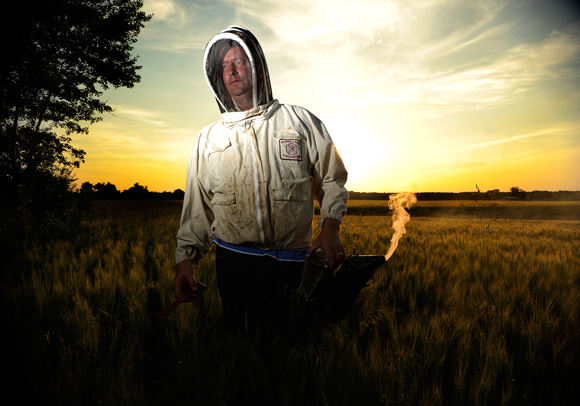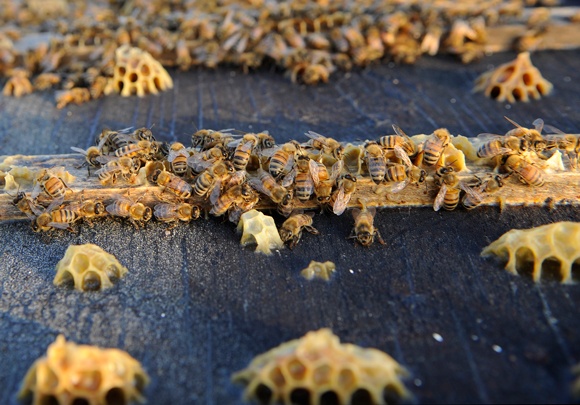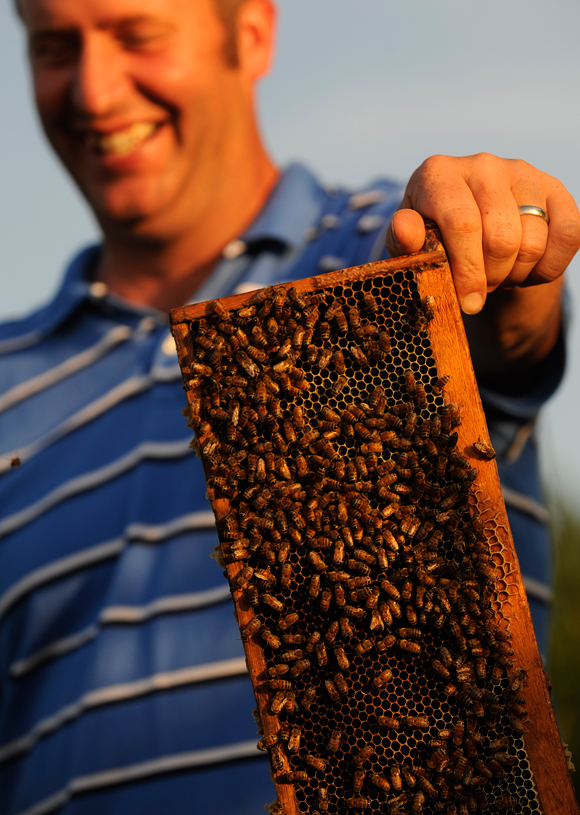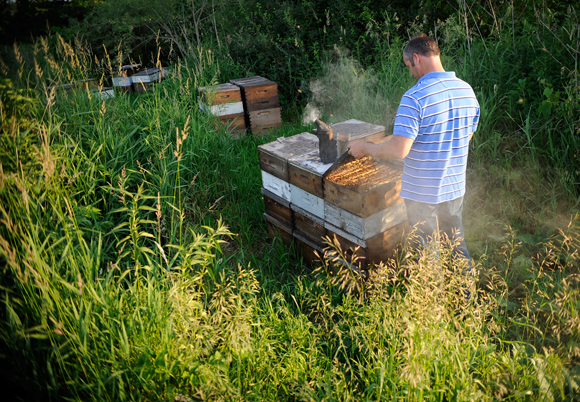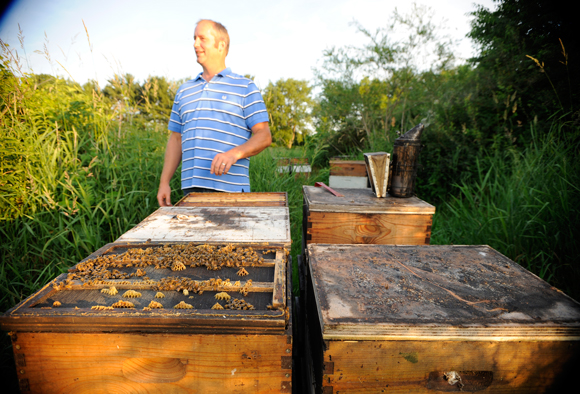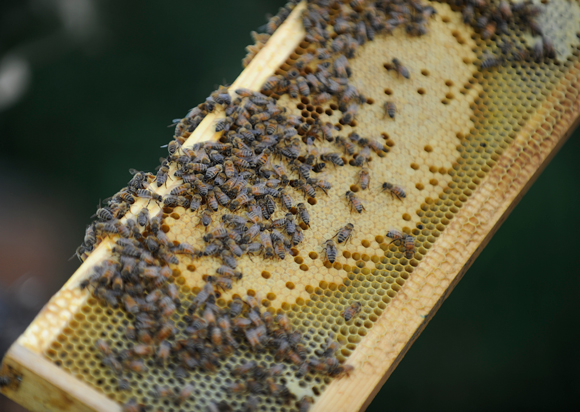The business of beekeeping in Southwest Michigan
The demand for honey is up and that's good for beekeepers. Now if only they can keep the bees alive. Zinta Aistars talks to Jon Nobel about a business that literally buzzes.
Jon Nobel’s calm gaze follows the buzzing flight of the honey bee without worry.
“If I’m going to get stung,” he says, “then I might as well do the beekeeping myself.” That was Nobel’s thought growing up and visiting his grandfather’s farm near Grand Rapids. He started beekeeping there as a hobby, keeping two beehives on the farm and checking on them a couple times a month. He was fascinated to watch the bees then and the fascination remains.
Jon Nobel and his bees produce Nobel Honey. He and wife Kari live in the blink-and-you’ll-miss-it village of Watson in Southwest Michigan, but his bees — they live all over the place. Well, not quite all over the place. Nobel places his hives at various farms and properties in and about Watson, along the 131-interstate corridor.
“I look for places about four miles apart so the bees don’t overlap,” he says. “I look for places near woods, not so much farm land that is being worked. I avoid corn fields, but wheat fields when not being tilled are good. I love clover!” He installs the hives late at night, or early in the morning when the bees are less active.
Avoiding areas sprayed with pesticides and other farming practices that may be harmful to the bees, Nobel currently has his hives placed on 11 properties. Property owners can either keep one beehive in lieu of rent for use of their property or collect 20 pounds of honey at harvest time.
Beekeeping is one of the most ancient human activities still in practice today. Evidence of beekeeping can be found as far back as 13,000 B.C.
“Beekeeping hasn’t changed much,” Nobel says. “We still use smoke while we gather the honey.” A bee smoker, a small hand-held device that produces smoke, calms the bees by masking alarm pheromones and fooling them into feeding on honey in preparation to abandon the hive due to fire. “Bees don’t like smoke any more than we do,” Nobel says. He puffs a white cloud of smoke from the device, and the bees immediately disperse and stop buzzing.
Nobel started beekeeping seriously in 2002, building up to 432 colonies at present, with plans to expand to 600 by mid-summer. He spends about 35 hours a week working, much of it “spot checking” the hives.
Approaching the hives, puffing white smoke all about him and wearing a hooded half-suit that covers the upper half of his body, Nobel removes the cover of one hive and lifts the screens up to the sun, examining the honeycombs. He smiles. The combs are filling with golden honey.
“I try not to check too often or I may feel discouraged that they are not making honey as fast as I would like,” he says. “These bees have been busy.”
About 10,000 bees live in each of Nobel’s hives. Each hive has a queen bee, female worker bees, and male drones for mating. A queen may live about three years, spending her time mating, laying eggs and eating, but the worker bees die in about six weeks.
Like any serious beekeeper, Nobel knows about CCD, or colony collapse disorder, but so far, he’s been lucky. CCD is a phenomenon in which worker bees abruptly die or disappear from a colony. It’s alarming when it happens because bees pollinate agricultural crops as well as pollinate plants in the wild. Food supplies and plant life are dependent on healthy bees. Mites, insect diseases, pesticides and herbicides all have been blamed for CCD, but so has human over-manipulation of beehives, including such practices as feeding bees corn syrup rather than honey. Likely, it is a combination of these factors, but ongoing studies are being questioned as some have been funded by companies that hold stake in making pesticides.
“A few years ago, I had trouble with mites,” says Nobel. Rather than lose more bees, Nobel and wife Kari migrated south to Florida during the harshest winter months to work the bees and give them what they needed to rebound. Loading the hives onto a flatbed truck, three tiers of hives on skids and tossing a net over the hives to allow air for bees to breathe without escaping, the Nobels made the journey south to warmer climes and citrus orchards. Nobel attributes his hives’ survival to this now annual migration.
“There’s definitely a difference in flavor when the bees are in an orange grove.” Nobel’s eyes light up. “Nothing like orange blossom honey. I put it on my grapefruit. I’ve developed a craving for it,” he says with a laugh.
The lighter the color of the honey, the better the price it brings from distributors. “Last year, I sold honey for $1.65 a pound for white honey, this year $1.90 a pound.” The demand for honey is up, he says. Most of his honey goes to distributors, but he does sell small quantities locally under the label Nobel Honey.
Benefits of honey are many, from helping with allergies and strengthening the immune system, to skin treatments, healing cuts and burns, or simply moisturizing. Organic food buyers appreciate it as a healthier source of sweetness than sugar. Honey can be added to warm milk as a sleep aid, or to hot tea to soothe a cough. And the list goes on.
Once Nobel’s gathered the full honeycombs he then extracts the honey into barrels. Extracting means removing the caps from the combs, a layer of wax the bees use to seal each honeycomb cell to keep the honey fresh. Each barrel contains 55 gallons of honey, all of which leaves Nobel with about 100 pounds of wax. On occasion, Nobel’s wife Kari has created beeswax candles from the remaining wax.
“Kari thought I had a gravy job,” Nobel grins, “until I had her come along to check hives wearing the protective gear in 90 degree weather.”
Kari has her own twist on their honey story. She thought Nobel was pretty sweet when she met him, but tired of waiting for his phone call. She found his number on the Nobel Honey label, gave the beekeeper a call, and the rest is history.
Zinta Aistars is a freelance writer from Hopkins and editor of the literary ezine The Smoking Poet.
Photos by Erik Holladay.
Jon Nobel checks on his bee hives.

